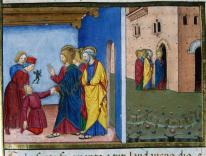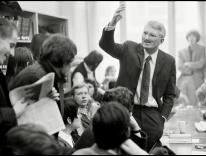In a recent speech commemorating the end of World War II, President George W. Bush dusted off a shopworn bit of far-right GOP dogma. He accused President Franklin D. Roosevelt of making a corrupt deal with Stalin at the Yalta Conference in 1945, thereby abandoning Eastern Europe to the clutches of the Soviet Union. This specious interpretation of Yalta has been debunked by historians, and Bush was criticized by many for reviving it. Yet, as it happens, I heard Cardinal Francis George of Chicago say the very same thing just a few days before Bush’s speech, at (of all things) an academic philosophy conference. It is a great virtue of liberal democracy that everyone-even presidents and cardinals- may express contentious opinions in the public square. But when the rhetoric of a cardinal archbishop is indistinguishable from that of a president, I worry a bit. When the rhetoric is that of the rightward fringe of the Republican Party circa 1952, I worry a lot.
The conference itself was a high-octane affair: Alasdair MacIntyre (After Virtue), Charles Taylor (Sources of the Self), and Jean-Luc Marion (God without Being), addressing the question, “What Can Philosophers Learn from the Tradition?” It was sponsored by the Lumen Christi Institute, a selfidentified institute for “Catholic faith, thought, and culture,” and held at the University of Chicago on April 30. Although the featured speakers were impressive, their remarks were overshadowed by those of Cardinal George. I now fear that Cardinal George, and by extension, certain elements of the Catholic hierarchy of which he is a central figure, may be conflating spiritual and political power in a way that will prove unhealthy both for the church and for the world.
George’s opening and closing remarks were on the recent papal conclave, but in between, the cardinal presented a strange, Manichean interpretation of twentieth-century history. According to George’s reading, the current spiritual problem of secularization in Europe is the result of unjust political decisions made by a panoply of American and European leaders. This, of course, implies that the problem of secularization is best solved by making the political order itself less secular. Indeed, George said as much.
The wheels of secularization were set in motion during World War I, George argued. President Woodrow Wilson, along with the leaders of France and Italy, turned “what had been essentially a trade war into a crusade for making the world safe for democracy.” Even worse, they prevented Pope Benedict XV from being a mediator among the combatants. Unlike Wilson, one supposes, Benedict XV “wanted to create a peace that wouldn’t destabilize all of Central Europe,” and for this reason, according to George, Wilson excluded the pope from the peace talks at the end of the war. Over the objections of Benedict XV, the allies imposed the Treaty of Versailles, and as a result “the secularization of Europe really began in earnest and the last remnants of Christendom were destroyed,” George said.
Those who aren’t up to speed on their European history might wonder how the Treaty of Versailles destroyed “the last remnants of Christendom.” Versailles broke up the defeated and belligerent Austro-Hungarian Empire, a Catholic empire led by Emperor Karl I, who was beatified, despite some controversy, by John Paul II in 2004. It is not an exaggeration to say that, in George’s view, at the close of World War I the forces of darkness-secular governments driven by the wanton pursuit of democracy-were arrayed against the forces of light: the Vatican, a Catholic emperor, and “Christendom.”
The next bit of George’s history lesson is more familiar. It is the story of how John Paul II ended communism. Here I emphasize only one point: It apparently isn’t enough to call John Paul II a genuine hero in the fight against communism.
Good stories also need villains, and among the villains of George’s story we find, again, the leaders of the major Western democracies in league with Stalin at the Yalta conference: “Stalin and Churchill and Roosevelt divided the world between slave and free and handed peoples over to the slavery of communism,” George said. But the effect of Yalta was not to deliver Eastern Europe to an oppressive Communist regime. Stalin’s Red Army had been in place well before the “Big Three” gathered at Yalta.
So here we have the twentieth century according to Cardinal George: Wilson had destabilized Central Europe and, against the advice of Benedict XV, created the conditions that allowed totalitarianism and secularism to flourish. Roosevelt ratified that totalitarianism at Yalta. In sharp contrast to the perfidious Roosevelt, a later pope, John Paul II, “didn’t want to rest, and didn’t, until the treaty of Yalta was effectively abrogated.” Note that in George’s telling, the papacy has been-whether by action or omission-the most important political institution in Europe, and certainly the only truly virtuous one.
Cardinal George brought his history up to the present by asserting that the European Union (EU) “defends a form of the destruction of Yalta” and by claiming that Benedict XVI wants to see the EU “born in a new way, if we can get beyond and behind Versailles.” I don’t know exactly what George meant by this reference to Yalta. Whatever its problems, the EU certainly isn’t a totalitarian, atheistic dictatorship. But I’m afraid I do know how to interpret the wish to get “behind Versailles.” I can’t see this as anything other than a call to make the governing institutions of Europe-not just the citizens of Europe-less secular. If this is not quite a call to return to Christendom, it is perilously close. After all, George explained, it was because of the Treaty of Versailles that the “secularization of Europe really began in earnest when the last remnants of Christendom were destroyed.”
I recognize that George spoke extemporaneously, and I am sure that he did not intend his remarks to be subjected to minute exegesis. Still, I get nervous when high-ranking church officials seem nostalgic for “Christendom.” Paul J. Griffiths, co-founder of the Lumen Christi Institute and chair of the Catholic Studies Department at the University of Illinois Chicago, does not believe that George was calling for a return to Christendom. According to Griffiths, George meant only to claim that in Europe “it is increasingly difficult to practice one’s religion as if it were the most important thing there is.” Furthermore, Griffiths said, it is often the case that “constitutional, democratic states are in fact deeply hostile to the practice of Christianity.” Yet even if this is what George meant, his remarks are still problematic.
Like Pope Benedict XVI, George believes that contemporary democratic societies are awash in relativism. Indeed, George seems to believe that secularism is the same thing as relativism, and that all secular, relativist societies will inevitably meet the same end as the totalitarian societies of the Soviet bloc. For example, he likened the present pope’s coming fight against secularism to the previous pope’s fight against communism. The lesson of both, said George, is that “you can’t deliver a stable society if, in order to protect personal freedom, you sacrifice objective truth and, particularly, moral truth. It’s a fault line, and it will destabilize our societies and bring them down...as certainly as the fault line in communism effected its demise.” This is an unfortunate confusion. Secularism isn’t the same thing as relativism, and neither is tantamount to state-enforced atheism. Convenient though it may be to think so, it simply is not the case that critics of the church are committed to the denial of all objective truth. Nor are they committed to the proposition that all is permitted and nothing is immoral. The conflation of secularism with relativism is an unfortunate mistake because it misrepresents the real pastoral context in which the church finds itself. The church must find a way to engage secular and religious people who embrace alternative moral codes and values that are genuinely compelling, though they are not the codes and values of the church. This is rather harder than thundering against imaginary relativists. As Alasdair Mac- Intyre said at the beginning of the conference: “In the entire universe, there are absolutely no relativists who are not American undergraduates!” The church hierarchy would do well to take those words to heart.
More to the point, I doubt that it makes much sense, either rhetorically or substantively, to deploy “Christendom” as the category with which the church opposes secularization. As Charles Taylor emphasized in his presentation, the church, at its best, has always realized that it must express itself in different ways to different cultures and civilizations in order to be heard. I can hardly imagine a worse way to evangelize Europe than by appealing to the virtues of a politically reconstituted Christendom.
Even if treating secularism as a political problem were rhetorically effective, it is a bad idea. To address the spiritual problem of secularism, the church must deploy spiritual tools: it must present the gospel as surpassingly beautiful and worthy of love. Sometimes, I think, the church even needs to get out of the way, and let the gospel present itself as surpassingly beautiful and worthy of love. But the church never needs to promote the gospel with the tools of the state. The tools of the state are gross and coercive. The love they elicit is, by definition, disordered. It is indeed wrong-as a certain kind of Catholic is fond of pointing out-to suppose that the authority of the church flows from the political order, but it is equally wrong to suppose that challenges to that authority are best countered with the tools of the political order.
So, to return to the title of the conference: What can philosophers learn from the tradition? No one, I hope, philosopher or not, has learned that the church needs Christendom in order to flourish, for surely that is a false lesson.


